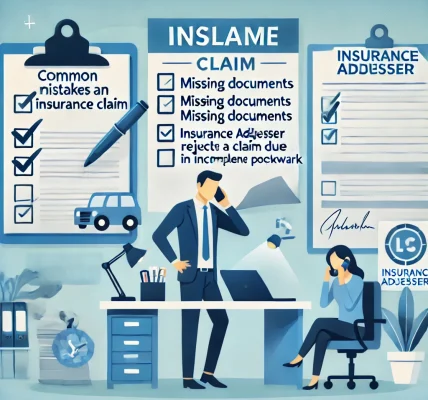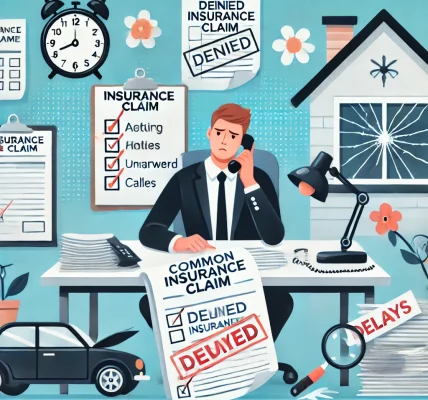When you file an insurance claim, one of the most critical players in the process is the insurance adjuster. Whether you are dealing with a car accident, property damage, health insurance, or any other type of claim, an adjuster plays a key role in evaluating the claim and determining the settlement amount. Understanding their role can help you navigate the claim process effectively and maximize your payout.
In this DIY guide, we will explain who an insurance adjuster is, what they do, how they assess claims, and how you can work with them to ensure a fair settlement.
Who Is an Insurance Adjuster?
An insurance adjuster (also called a claims adjuster) is a professional hired by an insurance company to investigate and assess insurance claims. Their primary responsibility is to verify the legitimacy of a claim, estimate the cost of damage, and recommend a settlement amount based on policy terms.
There are three main types of insurance adjusters:
- Company Adjusters – Employed directly by insurance companies to handle claims.
- Independent Adjusters – Hired by insurance firms on a contract basis to manage claims.
- Public Adjusters – Hired by policyholders to negotiate with insurance companies for a better settlement.
Understanding which type of adjuster you are dealing with can help you prepare your claim strategy.
What Does an Insurance Adjuster Do?
Insurance adjusters follow a structured process to evaluate and settle claims. Their key responsibilities include:
1. Investigating the Claim
- Review the policyholder’s claim and insurance policy details.
- Inspect the damage (property, vehicle, or medical reports in case of injury claims).
- Gather evidence such as photographs, receipts, police reports, and witness statements.
- Interview the policyholder and other involved parties.
2. Assessing the Damage and Liability
- Determine the extent of damage or loss.
- Calculate repair or replacement costs based on market rates.
- Assess whether the policy covers the reported damage.
- Verify if any third party is liable for the damage.
3. Negotiating the Claim Settlement
- Propose a settlement amount based on the findings.
- Discuss any deductibles or coverage limitations.
- If the policyholder disputes the settlement, adjusters may negotiate a revised amount.
4. Approving or Denying Claims
- Approve valid claims and process payments.
- Deny claims that don’t meet policy terms or appear fraudulent.
- Provide reasons for denial and information on appeal procedures.
How to Work Effectively with an Insurance Adjuster
To ensure a smooth and fair claim process, follow these tips:
1. Understand Your Policy Coverage
Before speaking with an adjuster, review your insurance policy carefully. Understand what is covered, exclusions, and policy limits. This will help you present your case effectively.
2. Document Everything
- Take clear photographs of the damage.
- Keep records of medical bills, repair estimates, and receipts.
- If applicable, obtain a police report or statements from witnesses.
- Maintain a written log of conversations with the adjuster, including dates and key discussion points.
3. Be Honest but Cautious
While it’s essential to provide accurate information, avoid oversharing or making assumptions. Stick to the facts and avoid speculating about the cause of damage or liability.
4. Get Multiple Estimates
For property or vehicle damage, get repair estimates from multiple service providers. This prevents the adjuster from undervaluing the repair costs.
5. Don’t Accept the First Offer Immediately
Adjusters may offer a lower settlement initially. If you feel the amount is unfair, negotiate and provide supporting documents for your counteroffer.
6. Seek a Public Adjuster If Necessary
If you believe the insurance company is undervaluing your claim, consider hiring a public adjuster to advocate for you and negotiate a better settlement.
7. Know Your Rights to Appeal
If your claim is denied, request a detailed explanation in writing. If you disagree, you can appeal the decision with additional evidence or seek legal assistance if necessary.
Common Mistakes to Avoid When Dealing with Insurance Adjusters
❌ Not reporting the claim on time – Always inform your insurer immediately after an incident. ❌ Providing incomplete or inconsistent information – This can lead to claim rejection. ❌ Accepting the first settlement offer without review – Always check if the amount is fair. ❌ Signing documents without understanding them – Read the fine print before agreeing to anything. ❌ Failing to keep records – Proper documentation is crucial for claim approval.
Frequently Asked Questions (FAQs)
Q1: Can I refuse to work with an insurance adjuster?
No, if you file an insurance claim, you must cooperate with the adjuster. However, you can seek assistance from a public adjuster or attorney if you feel the process is unfair.
Q2: Can an insurance adjuster deny my claim?
Yes, if the adjuster finds that the damage is not covered under your policy or suspects fraud, they can deny the claim. You have the right to appeal.
Q3: How long does an insurance adjuster take to process a claim?
Processing time varies by claim type and insurer. Simple claims may be settled in a few days, while complex cases can take weeks or even months.
Q4: Do I need a lawyer to negotiate with an adjuster?
Not always. However, if your claim is denied unfairly or the settlement offer is too low, consulting an attorney may be beneficial.
Q5: What should I do if I disagree with the adjuster’s valuation?
Gather additional evidence, obtain independent repair estimates, and negotiate with the insurer. If needed, escalate the claim to a supervisor or regulatory body.
Final Thoughts
Insurance adjusters play a crucial role in determining claim settlements. By understanding their process and preparing well, you can ensure a fair and smooth claims experience. Keep thorough documentation, negotiate effectively, and seek professional assistance if necessary.
Being informed is the best way to protect yourself and maximize your claim settlement. Follow this DIY guide to work confidently with insurance adjusters and secure the compensation you deserve.




